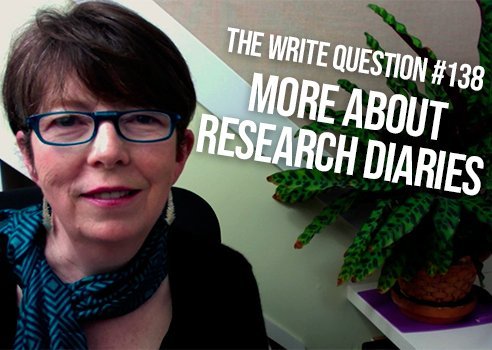Viewing time: 4 mins. 40 secs
The Write Question is a weekly video podcast about writing that I started in 2017 and that ran, more or less weekly, until April 2022. This is a republication of issue #138, which discusses where to keep your research diary. The post first ran on May 1/20.
Transcript:
Have you ever wondered how and where to keep your research diary? That’s the topic I’m addressing today in The Write Question. I’m Daphne Gray-Grant, the Publication Coach.
I have a question from Hannah Kirkman, a writer based in the U.K. Here’s what she asked by email….
“Thanks so much for sharing your writing advice in your book, Your Happy First Draft. I’ve found it to be incredibly helpful in finally building a writing habit, and I’ve published more blog posts in the last two months than the previous twelve. I have a quick question about developing a research diary. I’m curious to know what tool you use for this? It feels like something that would be very useful in organizing thoughts and ideas, but I’m not quite sure what approach might work best.”
Thanks for your question, Hannah. Before I answer, let me give a little more background on the concept of a research diary, so that all viewers of this video can understand what we’re talking about.
A research diary is a tool I highly recommend for anyone who needs to do significant research as part of their writing. Most notably, it is very useful for academics and anyone working on a long non-fiction book. But if the concept grabs your attention, Hannah, I’m guessing you need to do significant research for your writing, too. I include a link to a blog post I’ve written on the subject in the notes below.
When I use the word ‘tool’ you may envision a distinct piece of software or a specific book or something like that. Nope, I’m afraid not. It’s up to each of us how we want to maintain our research diaries.
I’m not keeping one right now because I’m not writing a book. But when I am diarizing, I put my notes in a simple Word document. Each entry begins with the date, and a description of what I’ve done on my project that day — and how I feel about what I’ve learned. It’s that simple.
Let me emphasize the diary does NOT contain the actual research. I keep my research in Evernote, see the link below. Instead, the diary captures my REACTION to the research I’ve been reading. It’s my thoughts, feelings, views and opinions.
The biggest benefit of a research diary is that it allows you to maintain your writing habit, even while you’re busy researching. Some writers allow themselves to get sucked into the vortex of research. They make notes, endless notes, and they end up procrastinating about writing. A research diary allows you to maintain the habit of writing so that you don’t become scared of it.
The other benefit is that a research diary forces you to declare your opinions about what you’re reading. If you’re only researching, you’ll be tempted to do nothing more than collect facts and citations. This diary — which records your opinions — will act as a counterweight to that natural tendency.
Remember: We’re all already drowning in facts. What readers want is intelligent and thoughtful responses to these facts.
Keep your diary anywhere you like. A Word document is fine. So is an Excel spreadsheet. So is a Moleskin notebook. So is a separate entry in whatever research software you use – whether it’s Evernote, EndNote, Mendeley or Zotero.
Just be sure to make a diary entry every day, even if you haven’t managed to work on your project. This is a form of accountability to yourself and it will help you stay connected with your work and maintain your motivation.
Hannah, daily accountability is way more important than whatever form your research diary takes.
Finally, let me wrap up with a quote from the great Irish poet and playwright Oscar Wilde: “I never travel without my diary. One should always have something sensational to read on the train.”
Hannah, I know the word ‘sensational’ is unlikely to apply to a research diary. Still, it is a tool you should not travel without, particularly if your writing requires significant research.
*
If you’d like to learn more about how to make writing a happier and more rewarding process, check out my latest book Your Happy First Draft. I don’t sell it in bookstores or via Amazon. The only place to buy it is on my website, link below and in the show notes.


